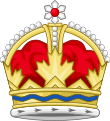
Back Minister für Einwanderung, Flüchtlinge und Staatsbürgerschaft German Ministre de l'Immigration, des Réfugiés et de la Citoyenneté French Departemen Kewarganegaraan dan Imigrasi Kanada ID
This article needs additional citations for verification. (April 2020) |
| Minister of Immigration, Refugees and Citizenship | |
|---|---|
| Ministre de l'Immigration, des Réfugiés et de la Citoyenneté | |
since 26 July 2023 | |
| Immigration, Refugees and Citizenship Canada | |
| Style | The Honourable |
| Member of | |
| Reports to | |
| Appointer | Monarch (represented by the governor general);[3] on the advice of the prime minister[4] |
| Term length | At His Majesty's pleasure |
| Constituting instrument | Department of Citizenship and Immigration Act |
| Precursor | |
| Inaugural holder | Sergio Marchi |
| Formation | 30 June 1994 |
| Deputy | Deputy Minister of Immigration, Refugees and Citizenship Canada |
| Salary | CA$269,800 (2019)[5] |
| Website | www.cic.gc.ca |
 |
|---|
| Part of a series on |
| Canadian citizenship |
|---|
|
|
The minister of immigration, refugees and citizenship (French: Ministre de l'immigration, des réfugiés et de la citoyenneté) is a minister of the Crown in the Canadian Cabinet. The minister is responsible for Immigration, Refugees and Citizenship Canada, which is the federal department responsible for immigration, refugee and citizenship issues in Canada.
The current minister is Marc Miller.[6]
Prior to the current position, the portfolios responsible for immigration in Canada throughout history were titled: Immigration and Colonization (1917–36), Mines and Resources (1936–50), Citizenship and Immigration (1950–66), Manpower and Immigration (1966–77), and of Employment and Immigration (1977–96). The office as it exists today was created in 1994 by the Department of Citizenship and Immigration Act.[7][8]
As of 2 July 2013, the Immigration, Refugees and Citizenship portfolio inherited primary responsibility for Passport Canada and the administration of the Canadian Passport Order from the Foreign Affairs and International Trade portfolio.[9] The Immigration and Refugee Board of Canada, though independent, also reports to the minister.[7]
- ^ "The Canadian Parliamentary system – Our Procedure – House of Commons". www.ourcommons.ca. Archived from the original on 1 January 2021. Retrieved 20 April 2020.
- ^ "Review of the Responsibilities and Accountabilities of Ministers and Senior Officials" (PDF). Archived (PDF) from the original on 5 December 2019. Retrieved 21 April 2020.
- ^ "Constitutional Duties". The Governor General of Canada. Archived from the original on 23 April 2020. Retrieved 20 April 2020.
- ^ "House of Commons Procedure and Practice – 1. Parliamentary Institutions – Canadian Parliamentary Institutions". www.ourcommons.ca. Archived from the original on 19 October 2021. Retrieved 20 April 2020.
- ^ "Indemnities, Salaries and Allowances". Library of Parliament. 11 April 2018. Archived from the original on 1 June 2017. Retrieved 21 September 2017.
- ^ "Trudeau overhauls his cabinet, drops 7 ministers and shuffles most portfolios". CBC News. 26 June 2023. Retrieved 26 June 2023.
- ^ a b Cite error: The named reference
:1was invoked but never defined (see the help page). - ^ "Department of Citizenship and Immigration Act, S.C. 1994, c. 31". 29 April 2013. Archived from the original on 30 July 2021. Retrieved 27 April 2021.
- ^ Immigration, Refugees and Citizenship Canada (4 December 2017). "Mandate — Immigration, Refugees and Citizenship Canada". aem. Archived from the original on 13 July 2018. Retrieved 27 April 2021.
